By Category
Antimicrobial Resistance - bacteria have evolved powerful defenses against antibiotics (9)
 |
Aminoglycoside Antibiotics
February 2012 Antibiotic-resistant bacteria build enzymes that destroy drugs like streptomycin |
 |
Aminoglycoside Antibiotics and Resistance
October 2018 Bacteria become resistant to aminoglycosides by destroying them or changing their target. |
 |
Dihydrofolate Reductase
October 2002 DHFR is a target for cancer chemotherapy and bacterial infection |
 |
Multidrug Resistance Transporters
November 2007 Many bacteria use multidrug resistance transporters to pump drugs and poisons out of the cell |
 |
New Delhi Metallo-Beta-Lactamase
July 2015 Antibiotics can save lives, but antibiotic-resistant strains of bacteria pose a dangerous threat |
 |
Penicillin-binding Proteins
May 2002 Penicillin attacks the proteins that build bacterial cell walls |
 |
Ribosome
January 2010 Ribosomes are complex molecular machines that build proteins |
 |
Tetrahydrobiopterin Biosynthesis
August 2015 Tetrahydrobiopterin plays an essential role in the production of aromatic amino acids, neurotransmitters and nitric oxide. |
 |
Vancomycin
December 2015 The antibiotic vancomycin blocks the construction of bacterial cell walls. |
Cancer - cells growing without controls (40)
 |
Actinomycin
April 2013 Some antibiotics attack cells by intercalating between the bases in a DNA double helix |
 |
Anaphase-Promoting Complex / Cyclosome
March 2023 APC/C guards the checkpoints that regulate key steps in the cell cycle |
 |
Apoptosomes
September 2014 Apoptosomes make life or death decisions in cells |
 |
ATM and ATR Kinases
August 2023 Dividing cells use ATM and ATR kinases to respond to DNA damage. |
 |
c-Abl Protein Kinase and Imatinib
July 2023 Protein kinases are being targeted by new anti-cancer drugs |
 |
Caspases
August 2004 Caspases disassemble proteins during the process of programmed cell death |
 |
Chimeric Antigen Receptors
October 2017 T cells may be engineered with chimeric antigen receptors to attack cancer cells. |
 |
Cisplatin and DNA
March 2021 Cisplatin treats cancer by causing damage to the DNA of cancer cells. |
 |
Cyclin and Cyclin-dependent Kinase
August 2019 Cyclins and cyclin-dependent kinases control when cells divide, making them important targets for cancer therapy. |
 |
Dihydrofolate Reductase
October 2002 DHFR is a target for cancer chemotherapy and bacterial infection |
 |
Epidermal Growth Factor
June 2010 EGF is part of a family of proteins that controls aspects of cell growth and development |
 |
Estrogen Receptor
September 2003 Estrogen binds to receptors in the nucleus and affects key genes in development |
 |
Glutathione Transferases
August 2017 Glutathione transferase tags toxic molecules, making them easy to recognize and remove. |
 |
Hepatitis C Virus Protease/Helicase
December 2020 Structures of hepatitis C viral proteins have led to the discovery of direct-acting antivirals. |
 |
HER2/neu and Trastuzumab
April 2022 Trastuzumab monoclonal antibodies targeting HER2 receptors are at the forefront of breast cancer treatment |
 |
Histone Deacetylases
September 2023 Histone deacetylases regulate access to genetic information by modifying histones |
 |
Hsp90
December 2008 Heat shock proteins ensure that proteins remain folded and active under harsh conditions |
 |
Human Papillomavirus and Vaccines
May 2018 The capsid protein of papillomavirus is used in vaccines that prevent cervical cancer. |
 |
Initiation Factor eIF4E
February 2019 Initiation factors for protein synthesis interact through disordered chains. |
 |
Major Histocompatibility Complex
February 2005 MHC displays peptides on the surfaces of cells, allowing the immune system to sense the infection inside |
 |
MDM2 and Cancer
June 2019 MDM2 controls the action of p53 tumor suppressor, making it a target for cancer chemotherapy. |
 |
Microtubules
July 2014 The largest filaments of the cytoskeleton provide tracks for transport throughout the cell |
 |
Nanodiscs and HDL
September 2019 Nanodiscs conveniently package a small piece of membrane for experimental studies. |
 |
Nicotine, Cancer, and Addiction
May 2022 Nicotine causes addiction by interacting with receptors in the brain |
 |
Non-Homologous End Joining Supercomplexes
July 2022 Lethal double-strand breaks in the DNA genome are repaired by NHEJ |
 |
p53 Tumor Suppressor
July 2002 p53 tumor suppressor protects the body from DNA damage and cancer |
 |
PD-1 (Programmed Cell Death Protein 1)
December 2016 PD-1 and its ligands are a new target for cancer therapy |
 |
Pyruvate Kinase M2
June 2022 Pyruvate kinases are the paradoxical gatekeepers for cancer cell metabolism and growth. |
 |
RAF Protein Kinases
March 2016 A single mutation in a RAF protein kinase can help transform a normal cell into a cancer cell. |
 |
Ras Protein
April 2012 Mutation of the growth-controlling ras protein can lead to cancer |
 |
RecA and Rad51
April 2014 Broken DNA strands may be repaired by matching sequences in a duplicate copy of the DNA |
 |
Ribonucleotide Reductase
October 2019 Ribonucleotide reductase creates the building blocks of DNA |
 |
Simian Virus 40
November 2003 SV40 hijacks the cells it infects using only a handful of proteins |
 |
Small Interfering RNA (siRNA)
February 2008 Our cells continually look for pieces of double-stranded RNA, a possible sign of viral infection |
 |
Spliceosomes
May 2020 Cryoelectron microscropy is revealing how spliceosomes cut-and-paste messenger RNA molecules. |
 |
Src Tyrosine Kinase
July 2003 Growth signaling proteins play an important role in the development of cancer |
 |
Telomerase
November 2018 Telomerase maintains the ends of our chromosomes. |
 |
Thymine Dimers
July 2007 Ultraviolet light damages our DNA, but our cells have ways to correct the damage |
 |
Topoisomerases
January 2006 Topoisomerases untangle and reduce the tension of DNA strands in the cell |
 |
Vascular Endothelial Growth Factor (VegF) and Angiogenesis
March 2022 VegF promotes blood vessel formation (angiogenesis), affecting cancer proliferation, wound healing, and other bodily processes. |
Coronavirus - coronavirus structures and the search for a cure (7)
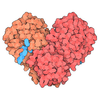 |
Coronavirus Proteases
February 2020 Coronavirus proteases are attractive targets for the design of antiviral drugs. |
| Glucocorticoid Receptor and Dexamethasone
June 2021 An anti-inflammatory drug has given us a new way to fight the COVID-19 pandemic. |
|
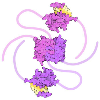 |
SARS-CoV-2 Nucleocapsid and Home Tests
February 2023 Home test kits for SARS-CoV-2 test for the presence of nucleocapsid, the protein that packages the viral genome in infectious virions. |
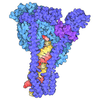 |
SARS-CoV-2 RNA-dependent RNA Polymerase
September 2020 Coronaviruses duplicate their RNA genome using a specialized polymerase |
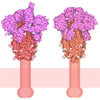 |
SARS-CoV-2 Spike
June 2020 Coronavirus spike protein binds to receptors on cell surfaces, and is a target for vaccine development. |
 |
SARS-CoV-2 Spike and Antibodies
April 2021 Structural biologists are revealing the many ways that antibodies recognize SARS-CoV-2 |
 |
SARS-CoV-2 Spike Variants
December 2021 SARS-CoV-2 is constantly changing, posing new challenges during the COVID19 pandemic |
Diabetes - causes and cures (8)
 |
Designer Insulins
February 2016 Engineered insulins have been developed to improve treatment of diabetes |
 |
Dipeptidyl Peptidase 4
October 2016 Inhibitors of dipeptidyl peptidase 4 are used to treat type-2 diabetes |
 |
Glucagon
April 2015 Glucagon triggers the release of glucose into the blood, to power cells throughout the body |
 |
Glucose Oxidase
May 2006 Glucose oxidase measures blood glucose level in biosensors |
 |
Glucose Transporters
April 2017 Glucose transporters deliver glucose molecules one-by-one across cell membranes. |
 |
Insulin
February 2001 The hormone insulin helps control the level of glucose in the blood |
 |
Insulin Receptor
February 2015 The cellular receptor for insulin helps control the utilization of glucose by cells |
 |
Receptor for Advanced Glycation End Products
June 2015 RAGE recognizes sugar-modified proteins, contributing to an inflammatory response that plays a role in diabetes |
Drug Action - antibiotics, therapeutics and their molecular targets (33)
 |
Actinomycin
April 2013 Some antibiotics attack cells by intercalating between the bases in a DNA double helix |
 |
Adrenergic Receptors
April 2008 Adrenaline stimulates a G-protein-coupled receptor, priming us for action |
 |
Aminoglycoside Antibiotics
February 2012 Antibiotic-resistant bacteria build enzymes that destroy drugs like streptomycin |
 |
Aminoglycoside Antibiotics and Resistance
October 2018 Bacteria become resistant to aminoglycosides by destroying them or changing their target. |
 |
Anaphase-Promoting Complex / Cyclosome
March 2023 APC/C guards the checkpoints that regulate key steps in the cell cycle |
 |
Beta-secretase
July 2009 Beta-secretase trims proteins in the cell and plays an important role in Alzheimer's disease |
 |
Circadian Clock Proteins
January 2008 Circadian clock proteins measure time in our cells |
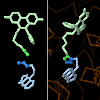 |
Click Chemistry
December 2022 A modular approach to chemistry simplifies the construction of complex protein-targeting molecules. |
 |
Cyclooxygenase
May 2001 Aspirin attacks an important enzyme in pain signaling and blood clotting |
 |
Cytochrome p450
October 2006 Cytochrome p450 detoxifies and solubilizes drugs and poisons by modifying them with oxygen |
 |
Dihydrofolate Reductase
October 2002 DHFR is a target for cancer chemotherapy and bacterial infection |
 |
Estrogen Receptor
September 2003 Estrogen binds to receptors in the nucleus and affects key genes in development |
| Glucocorticoid Receptor and Dexamethasone
June 2021 An anti-inflammatory drug has given us a new way to fight the COVID-19 pandemic. |
|
 |
Glutamate-gated Chloride Receptors
November 2015 The antibiotic ivermectin attacks glutamate-gated chloride channels, paralyzing parasitic worms. |
 |
Glutathione Transferases
August 2017 Glutathione transferase tags toxic molecules, making them easy to recognize and remove. |
 |
Histone Deacetylases
September 2023 Histone deacetylases regulate access to genetic information by modifying histones |
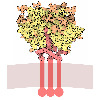 |
HIV Envelope Glycoprotein
January 2014 Envelope protein attaches HIV to the cells that it infects and powers fusion of the virus with the cell membrane |
 |
Influenza Neuraminidase
May 2009 Neuraminidase is an important target for influenza drugs |
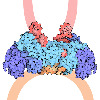 |
Integrase
March 2011 HIV integrase allows HIV to insert itself into the genome of an infected cell |
 |
Interferons
August 2010 Interferons mobilize defenses against viral infection |
 |
Lactate Dehydrogenase
June 2008 Our cells temporarily build lactate when supplies of oxygen are low |
 |
Microtubules
July 2014 The largest filaments of the cytoskeleton provide tracks for transport throughout the cell |
 |
Multidrug Resistance Transporters
November 2007 Many bacteria use multidrug resistance transporters to pump drugs and poisons out of the cell |
 |
Neurotransmitter Transporters
March 2014 Neurotransmitters are transported out of nerve synapses to end a signal transmission |
 |
New Delhi Metallo-Beta-Lactamase
July 2015 Antibiotics can save lives, but antibiotic-resistant strains of bacteria pose a dangerous threat |
 |
Nitric Oxide Synthase
January 2011 Nitric oxide gas is used as a rapid-acting hormone and as a powerful defense |
 |
Opioid Receptors
January 2018 Morphine and other opioid drugs bind to receptors in the nervous system, controlling pain |
 |
P-glycoprotein
March 2010 P-glycoprotein pumps toxic molecules out of our cells |
 |
Penicillin-binding Proteins
May 2002 Penicillin attacks the proteins that build bacterial cell walls |
 |
Ribosome
January 2010 Ribosomes are complex molecular machines that build proteins |
 |
Serotonin Receptor
August 2013 Serotonin receptors control mood, emotion, and many other behaviors, and are targets for many important drugs |
 |
Tetrahydrobiopterin Biosynthesis
August 2015 Tetrahydrobiopterin plays an essential role in the production of aromatic amino acids, neurotransmitters and nitric oxide. |
 |
Vancomycin
December 2015 The antibiotic vancomycin blocks the construction of bacterial cell walls. |
Drugs and the Brain - molecules for mental health (12)
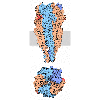 |
Acetylcholine Receptor
November 2005 The neurotransmitter acetylcholine opens a protein channel, stimulating muscle contraction |
 |
Acetylcholinesterase
June 2004 Acetylcholinesterase stops the signal between a nerve cell and a muscle cell |
 |
Adrenergic Receptors
April 2008 Adrenaline stimulates a G-protein-coupled receptor, priming us for action |
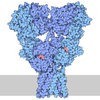 |
AMPA Receptor
July 2019 Receptors for the neurotransmitter glutamate in our brain come in several shapes and sizes. |
 |
Calcium Pump
March 2004 Atomic structures have captured the calcium pump in action |
 |
Capsaicin Receptor TRPV1
October 2020 TRPV1 is an ion channel that senses heat and contributes to pain sensation. |
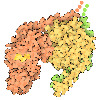 |
G Proteins
October 2004 G proteins receive signals from cellular receptors and deliver them inside the cell |
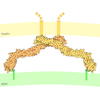 |
Myelin-associated Glycoprotein
July 2020 Nerve axons are insulated and protected by a sheath of myelin |
 |
Opioid Receptors
January 2018 Morphine and other opioid drugs bind to receptors in the nervous system, controlling pain |
 |
Piezo1 Mechanosensitive Channel
July 2018 Mechanosensitive ion channels give our cells a sense of touch. |
 |
Sodium-Potassium Pump
October 2009 Cells continually pump sodium ions out and potassium ions in, powered by ATP |
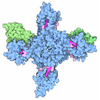 |
Voltage-gated Sodium Channels
March 2020 Voltage-gated sodium channels transmit signals in a wave through the nervous system. |
HIV and AIDS - the virus and how we fight it (8)
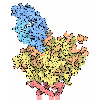 |
Broadly Neutralizing Antibodies
February 2014 Structural studies of broadly neutralizing antibodies are paving the way to vaccines for HIV, influenza and RSV |
 |
Cascade and CRISPR
January 2015 Cascade and CRISPR help bacteria remember how to fight viral infection |
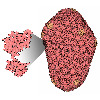 |
HIV Capsid
July 2013 At the center of HIV, an unusual cone-shaped capsid protects the viral genome and delivers it into infected cells |
 |
HIV Envelope Glycoprotein
January 2014 Envelope protein attaches HIV to the cells that it infects and powers fusion of the virus with the cell membrane |
 |
HIV Reverse Transcriptase
September 2002 HIV builds a DNA copy of its RNA genome, providing a unique target for drug therapy |
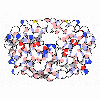 |
HIV-1 Protease
June 2000 Atomic structures of HIV protease have been used to design powerful drugs for HIV therapy |
 |
Integrase
March 2011 HIV integrase allows HIV to insert itself into the genome of an infected cell |
 |
T-Cell Receptor
March 2005 Lymphocytes use T-cell receptors to patrol the body for foreign molecules |
Immune System - our protection from infection (25)
 |
Antibodies
September 2001 Antibodies search for foreign molecules in the blood |
 |
Broadly Neutralizing Antibodies
February 2014 Structural studies of broadly neutralizing antibodies are paving the way to vaccines for HIV, influenza and RSV |
 |
Chimeric Antigen Receptors
October 2017 T cells may be engineered with chimeric antigen receptors to attack cancer cells. |
 |
Dermcidin
June 2013 Small toxic peptides help protect us from bacterial infection |
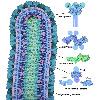 |
Ebola Virus Proteins
October 2014 Structures of ebola virus proteins are giving new hope for fighting this deadly virus |
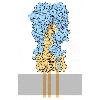 |
Hemagglutinin
April 2006 Influenza virus binds to cells and infects them using hemagglutinin |
 |
Influenza Neuraminidase
May 2009 Neuraminidase is an important target for influenza drugs |
 |
Interferons
August 2010 Interferons mobilize defenses against viral infection |
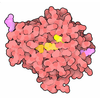 |
Legumain
August 2018 Legumain cleaves proteins, and can also put them back together. |
 |
Lysozyme
September 2000 Lysozyme attacks the cell walls of bacteria |
 |
Major Histocompatibility Complex
February 2005 MHC displays peptides on the surfaces of cells, allowing the immune system to sense the infection inside |
 |
Measles Virus Proteins
March 2019 Six proteins in measles virus work together to infect cells. |
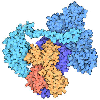 |
MHC I Peptide Loading Complex
April 2023 Several steps of quality control optimize the peptides that are displayed by MHC I. |
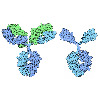 |
Nanobodies
April 2011 Unusual antibodies from camels are useful in research and medicine |
 |
PD-1 (Programmed Cell Death Protein 1)
December 2016 PD-1 and its ligands are a new target for cancer therapy |
 |
RSV Fusion Glycoprotein
October 2023 Structures of the fusion glycoprotein from respiratory syncytial virus (RSV) were used to engineer effective vaccines to fight viral infection. |
 |
SARS-CoV-2 Nucleocapsid and Home Tests
February 2023 Home test kits for SARS-CoV-2 test for the presence of nucleocapsid, the protein that packages the viral genome in infectious virions. |
 |
SARS-CoV-2 Spike and Antibodies
April 2021 Structural biologists are revealing the many ways that antibodies recognize SARS-CoV-2 |
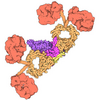 |
Secretory Antibodies
August 2022 Secretory immunoglobulins are our most abundant antibodies, providing a first line of defense against pathogens. |
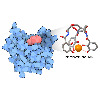 |
Siderocalin
January 2016 Our innate immune system starves bacteria of iron using siderocalin. |
 |
Small Interfering RNA (siRNA)
February 2008 Our cells continually look for pieces of double-stranded RNA, a possible sign of viral infection |
 |
T-Cell Receptor
March 2005 Lymphocytes use T-cell receptors to patrol the body for foreign molecules |
 |
Tissue Transglutaminase and Celiac Disease
May 2017 Tissue transglutaminase staples proteins together by forming a chemical crosslink. |
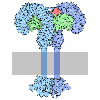 |
Toll-like Receptors
November 2011 Toll-like receptors warn us about bacterial and viral infection |
 |
ZAR1 Resistosome
November 2023 Plants protect themselves from infection with immune system machines such as the resistosome |
Infectious Disease - fighting microbial dangers (13)
 |
Aminoglycoside Antibiotics
February 2012 Antibiotic-resistant bacteria build enzymes that destroy drugs like streptomycin |
 |
Aminoglycoside Antibiotics and Resistance
October 2018 Bacteria become resistant to aminoglycosides by destroying them or changing their target. |
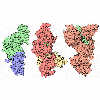 |
Anthrax Toxin
April 2002 Anthrax bacteria build a deadly three-part toxin |
 |
Cholera Toxin
September 2005 Many bacterial toxins have two parts: one that finds a cell, the other that kills it |
 |
Circadian Clock Proteins
January 2008 Circadian clock proteins measure time in our cells |
 |
H5 Hemagglutinin
February 2025 Sugar-binding protein on the surface of the H5N1 avian influenza virus |
 |
Injectisome
June 2024 Salmonella bacteria inject a cocktail of effector proteins into cells to disable their defenses. |
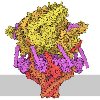 |
Malaria Parasite PTEX
November 2024 The parasite that causes malaria exports hundreds of proteins to remodel the cells that it infects. |
 |
New Delhi Metallo-Beta-Lactamase
July 2015 Antibiotics can save lives, but antibiotic-resistant strains of bacteria pose a dangerous threat |
 |
Penicillin-binding Proteins
May 2002 Penicillin attacks the proteins that build bacterial cell walls |
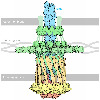 |
Pilus Machine
July 2017 A molecular machine with a rotary motor builds a long protein filament involved in bacterial motility and attachment. |
 |
Toll-like Receptors
November 2011 Toll-like receptors warn us about bacterial and viral infection |
 |
Vancomycin
December 2015 The antibiotic vancomycin blocks the construction of bacterial cell walls. |
Peak Performance - the structural biology of athletics and well-being (38)
 |
Acetohydroxyacid Synthase
November 2021 In plants, AHAS performs the first step in synthesis of three essential amino acids, making it an effective target for herbicides. |
 |
Adrenergic Receptors
April 2008 Adrenaline stimulates a G-protein-coupled receptor, priming us for action |
 |
Alcohol Dehydrogenase
January 2001 Alcohol dehydrogenase detoxifies the ethanol we drink |
 |
Anabolic Steroids
August 2007 Anabolic steroids like testosterone are among the most common performance enhancing drugs |
 |
Angiotensin and Blood Pressure
October 2024 Many medications for controlling high blood pressure inhibit the action of the peptide hormone angiotensin. |
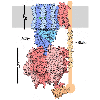 |
ATP Synthase
December 2005 ATP synthase links two rotary motors to generate ATP |
 |
Calcium Pump
March 2004 Atomic structures have captured the calcium pump in action |
 |
Carbonic Anhydrase
January 2004 Carbonic anhydrase solubilizes carbon dioxide gas so we can breathe it out |
 |
Catalase
September 2004 Catalase protects us from dangerous reactive oxidizing molecules |
 |
Circadian Clock Proteins
January 2008 Circadian clock proteins measure time in our cells |
 |
Citric Acid Cycle
October 2012 Eight enzymes form a cyclic pathway for energy production and biosynthesis |
 |
Complex I
December 2011 A proton-pumping protein complex performs the first step of the respiratory electron transport chain |
 |
Cytochrome c Oxidase
May 2000 Cytochrome oxidase extracts energy from food using oxygen |
 |
Estrogen Receptor
September 2003 Estrogen binds to receptors in the nucleus and affects key genes in development |
 |
Fatty Acid Synthase
June 2007 Fatty acids are constructed in many sequential steps by a large protein complex |
 |
Glycogen Phosphorylase
December 2001 Glycogen phosphorylase releases sugar from its cellular storehouse |
 |
Glycolytic Enzymes
February 2004 The ten enzymes of glycolysis break down sugar in our diet |
 |
Growth Hormone
April 2004 Growth hormone brings together two copies of its cellular receptor |
 |
Hemoglobin
May 2003 Hemoglobin uses a change in shape to increase the efficiency of oxygen transport |
 |
Hypoxia-Inducible Factors
December 2019 HIF-α is a molecular switch that responds to changing oxygen levels. |
 |
Lactate Dehydrogenase
June 2008 Our cells temporarily build lactate when supplies of oxygen are low |
 |
Lead Poisoning
April 2016 Lead ions poison proteins throughout the body, blocking their normal function. |
 |
Leptin
May 2012 Problems with the appetite-controlling hormone leptin can lead to obesity |
 |
Monellin
July 2016 Monellin and other supersweet proteins trick our taste receptors. |
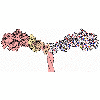 |
Myosin
June 2001 Molecular motors fueled by ATP power the contraction of muscles |
 |
Nicotine, Cancer, and Addiction
May 2022 Nicotine causes addiction by interacting with receptors in the brain |
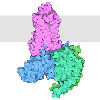 |
Odorant Receptors
June 2023 Our sense of smell relies on odorant receptors that recognize specific scents. |
 |
Opioid Receptors
January 2018 Morphine and other opioid drugs bind to receptors in the nervous system, controlling pain |
 |
Oxidosqualene Cyclase
December 2007 Oxidosqualine cyclase forms the unusual fused rings of cholesterol molecules |
 |
Pyruvate Dehydrogenase Complex
September 2012 A huge molecular complex links three sequential reactions for energy production |
 |
Respiratory Supercomplex
September 2022 In our mitochondria, three electron-transport complexes assemble into a supercomplex. |
 |
Rhodopsin
March 2012 In our eyes, rhodopsin uses the molecule retinal to see light |
 |
S-Nitrosylated Hemoglobin
May 2019 Nitric oxide is attached to a conserved cysteine in hemoglobin and then released to control the flow of blood. |
 |
Serotonin Receptor
August 2013 Serotonin receptors control mood, emotion, and many other behaviors, and are targets for many important drugs |
 |
Sodium-Potassium Pump
October 2009 Cells continually pump sodium ions out and potassium ions in, powered by ATP |
 |
Superoxide Dismutase
October 2007 Superoxide dismutase protects us from dangerously reactive forms of oxygen |
 |
Vitamin D Receptor
November 2012 Vitamin D helps regulate the use of calcium throughout the body |
 |
Vitamins
December 2023 Vitamins are essential molecular tools that are obtained through a healthy diet. |
Toxins and Poisons - attacking essential molecular machinery (17)
 |
Acetylcholine Receptor
November 2005 The neurotransmitter acetylcholine opens a protein channel, stimulating muscle contraction |
 |
Acetylcholinesterase
June 2004 Acetylcholinesterase stops the signal between a nerve cell and a muscle cell |
 |
Actin
July 2001 Cells are supported by a cytoskeleton of protein filaments |
 |
Anthrax Toxin
April 2002 Anthrax bacteria build a deadly three-part toxin |
 |
Aquaporin
May 2014 Aquaporins create a channel for water molecules to cross through cell membranes |
 |
Cholera Toxin
September 2005 Many bacterial toxins have two parts: one that finds a cell, the other that kills it |
 |
Cytochrome p450
October 2006 Cytochrome p450 detoxifies and solubilizes drugs and poisons by modifying them with oxygen |
 |
G Proteins
October 2004 G proteins receive signals from cellular receptors and deliver them inside the cell |
 |
Glutathione Transferases
August 2017 Glutathione transferase tags toxic molecules, making them easy to recognize and remove. |
 |
Hemoglobin
May 2003 Hemoglobin uses a change in shape to increase the efficiency of oxygen transport |
 |
Lead Poisoning
April 2016 Lead ions poison proteins throughout the body, blocking their normal function. |
 |
Phospholipase A2
November 2019 Phospholipase A2 breaks membrane lipids, forming molecules that contribute to inflammation and pain signaling. |
 |
Potassium Channels
February 2003 Potassium channels allow potassium ions to pass, but block smaller sodium ions |
 |
Ricin
May 2013 The structure of ricin reveals how it kills cells and how vaccines can produce immunity against ricin poisoning |
 |
RNA Polymerase
April 2003 RNA polymerase transcribes genetic information from DNA into RNA |
 |
Sodium-Potassium Pump
October 2009 Cells continually pump sodium ions out and potassium ions in, powered by ATP |
 |
Topoisomerases
January 2006 Topoisomerases untangle and reduce the tension of DNA strands in the cell |
Vaccines - exploring the molecular basis of vaccinations (16)
 |
Adenovirus
December 2010 Adenovirus has an icosahedral capsid with unusual cell-binding fibers |
 |
Broadly Neutralizing Antibodies
February 2014 Structural studies of broadly neutralizing antibodies are paving the way to vaccines for HIV, influenza and RSV |
 |
Dengue Virus
July 2008 Atomic structures of dengue virus are giving new hope for creation of a vaccine |
 |
Eastern Equine Encephalitis Virus
June 2025 Infection by EEEV can cause severe neurological disease |
 |
Fifty Years of Open Access to PDB Structures
October 2021 The Protein Data Bank is celebrating its golden anniversary! |
 |
HIV Envelope Glycoprotein
January 2014 Envelope protein attaches HIV to the cells that it infects and powers fusion of the virus with the cell membrane |
 |
HIV-1 Protease
June 2000 Atomic structures of HIV protease have been used to design powerful drugs for HIV therapy |
 |
Human Papillomavirus and Vaccines
May 2018 The capsid protein of papillomavirus is used in vaccines that prevent cervical cancer. |
 |
Influenza Neuraminidase
May 2009 Neuraminidase is an important target for influenza drugs |
 |
Measles Virus Proteins
March 2019 Six proteins in measles virus work together to infect cells. |
 |
Parvoviruses
May 2010 Viruses that cause distemper are surrounded by an icosahedral capsid |
 |
Poliovirus and Rhinovirus
August 2001 Crystallographic structures reveal the atomic details of viruses and how to fight them |
 |
Ricin
May 2013 The structure of ricin reveals how it kills cells and how vaccines can produce immunity against ricin poisoning |
 |
RSV Fusion Glycoprotein
October 2023 Structures of the fusion glycoprotein from respiratory syncytial virus (RSV) were used to engineer effective vaccines to fight viral infection. |
 |
SARS-CoV-2 Spike
June 2020 Coronavirus spike protein binds to receptors on cell surfaces, and is a target for vaccine development. |
 |
SARS-CoV-2 Spike and Antibodies
April 2021 Structural biologists are revealing the many ways that antibodies recognize SARS-CoV-2 |
Viruses - cellular hijackers (31)
 |
Adenovirus
December 2010 Adenovirus has an icosahedral capsid with unusual cell-binding fibers |
 |
Bacteriophage phiX174
February 2000 Bacteriophage phiX174 hijacks bacterial cells and forces them to make new copies of the virus |
 |
Broadly Neutralizing Antibodies
February 2014 Structural studies of broadly neutralizing antibodies are paving the way to vaccines for HIV, influenza and RSV |
 |
Coronavirus Proteases
February 2020 Coronavirus proteases are attractive targets for the design of antiviral drugs. |
 |
Dengue Virus
July 2008 Atomic structures of dengue virus are giving new hope for creation of a vaccine |
 |
Eastern Equine Encephalitis Virus
June 2025 Infection by EEEV can cause severe neurological disease |
 |
Ebola Virus Proteins
October 2014 Structures of ebola virus proteins are giving new hope for fighting this deadly virus |
| Glucocorticoid Receptor and Dexamethasone
June 2021 An anti-inflammatory drug has given us a new way to fight the COVID-19 pandemic. |
|
 |
H5 Hemagglutinin
February 2025 Sugar-binding protein on the surface of the H5N1 avian influenza virus |
 |
Hemagglutinin
April 2006 Influenza virus binds to cells and infects them using hemagglutinin |
 |
Hepatitis C Virus Protease/Helicase
December 2020 Structures of hepatitis C viral proteins have led to the discovery of direct-acting antivirals. |
 |
HIV Capsid
July 2013 At the center of HIV, an unusual cone-shaped capsid protects the viral genome and delivers it into infected cells |
 |
HIV Envelope Glycoprotein
January 2014 Envelope protein attaches HIV to the cells that it infects and powers fusion of the virus with the cell membrane |
 |
HIV Reverse Transcriptase
September 2002 HIV builds a DNA copy of its RNA genome, providing a unique target for drug therapy |
 |
Human Papillomavirus and Vaccines
May 2018 The capsid protein of papillomavirus is used in vaccines that prevent cervical cancer. |
 |
Influenza Neuraminidase
May 2009 Neuraminidase is an important target for influenza drugs |
 |
Integrase
March 2011 HIV integrase allows HIV to insert itself into the genome of an infected cell |
 |
Measles Virus Proteins
March 2019 Six proteins in measles virus work together to infect cells. |
 |
Parvoviruses
May 2010 Viruses that cause distemper are surrounded by an icosahedral capsid |
 |
Poliovirus and Rhinovirus
August 2001 Crystallographic structures reveal the atomic details of viruses and how to fight them |
 |
Quasisymmetry in Icosahedral Viruses
August 2016 Viruses use quasisymmetry to build large capsids out of many small subunits |
 |
RSV Fusion Glycoprotein
October 2023 Structures of the fusion glycoprotein from respiratory syncytial virus (RSV) were used to engineer effective vaccines to fight viral infection. |
 |
SARS-CoV-2 Nucleocapsid and Home Tests
February 2023 Home test kits for SARS-CoV-2 test for the presence of nucleocapsid, the protein that packages the viral genome in infectious virions. |
 |
SARS-CoV-2 RNA-dependent RNA Polymerase
September 2020 Coronaviruses duplicate their RNA genome using a specialized polymerase |
 |
SARS-CoV-2 Spike
June 2020 Coronavirus spike protein binds to receptors on cell surfaces, and is a target for vaccine development. |
 |
SARS-CoV-2 Spike and Antibodies
April 2021 Structural biologists are revealing the many ways that antibodies recognize SARS-CoV-2 |
 |
Simian Virus 40
November 2003 SV40 hijacks the cells it infects using only a handful of proteins |
 |
Small Interfering RNA (siRNA)
February 2008 Our cells continually look for pieces of double-stranded RNA, a possible sign of viral infection |
 |
Tobacco Mosaic Virus
January 2009 A cylindrical arrangement of proteins protects a long strand of RNA in TMV |
 |
YES Complex
April 2024 Bacteriophage phiX174 makes a small protein that kills bacterial cells. |
 |
Zika Virus
May 2016 Cryo-electron microscopy reveals the structure of Zika virus |
You and Your Health - the molecules that keep us alive (59)
 |
ABO Blood Type Glycosyltransferases
December 2012 ABO blood types are determined by an enzyme that attaches sugars to proteins |
 |
Acetylcholinesterase
June 2004 Acetylcholinesterase stops the signal between a nerve cell and a muscle cell |
 |
Alcohol Dehydrogenase
January 2001 Alcohol dehydrogenase detoxifies the ethanol we drink |
 |
Amyloid-beta Precursor Protein
July 2006 Cell-clogging amyloids form when proteins improperly aggregate |
 |
Amyloids
September 2015 Alzheimer's disease and prion diseases are linked to unnatural aggregation of proteins into amyloid fibrils. |
 |
Anabolic Steroids
August 2007 Anabolic steroids like testosterone are among the most common performance enhancing drugs |
 |
Angiotensin and Blood Pressure
October 2024 Many medications for controlling high blood pressure inhibit the action of the peptide hormone angiotensin. |
 |
Apoptosomes
September 2014 Apoptosomes make life or death decisions in cells |
 |
Beta-secretase
July 2009 Beta-secretase trims proteins in the cell and plays an important role in Alzheimer's disease |
 |
Calcium Pump
March 2004 Atomic structures have captured the calcium pump in action |
 |
Carbonic Anhydrase
January 2004 Carbonic anhydrase solubilizes carbon dioxide gas so we can breathe it out |
 |
Carotenoid Oxygenase
June 2005 Light-sensing retinal molecules are built from colorful carotenoids in our diet |
 |
Caspases
August 2004 Caspases disassemble proteins during the process of programmed cell death |
 |
Catalase
September 2004 Catalase protects us from dangerous reactive oxidizing molecules |
 |
CFTR and Cystic Fibrosis
May 2024 Cystic fibrosis is currently treated using drugs that enhance the function of mutated CFTR |
 |
Circadian Clock Proteins
January 2008 Circadian clock proteins measure time in our cells |
 |
Collagen
April 2000 Sturdy fibers of collagen give structure to our bodies |
 |
Crystallins
July 2010 A concentrated solution of crystallins refracts light in our eye lens |
 |
Cytochrome p450
October 2006 Cytochrome p450 detoxifies and solubilizes drugs and poisons by modifying them with oxygen |
 |
DNA Methyltransferases
July 2011 Cells add methyl groups to their DNA to encode additional epigenetic information |
 |
Estrogen Receptor
September 2003 Estrogen binds to receptors in the nucleus and affects key genes in development |
 |
Fetal Hemoglobin
May 2021 Fetal hemoglobin allows a growing fetus to receive oxygen from their mother. |
 |
Fibrin
November 2006 Rod-shaped fibrin molecules link together to form blood clots |
 |
Glucansucrase
June 2011 Bacteria adhere to our teeth by building sticky sugar chains |
 |
Growth Hormone
April 2004 Growth hormone brings together two copies of its cellular receptor |
 |
Hemoglobin
May 2003 Hemoglobin uses a change in shape to increase the efficiency of oxygen transport |
 |
Hyaluronidases
March 2024 Long carbohydrate chains are used to make our bodies flexible and resilient. |
 |
Hypoxanthine-guanine phosphoribosyltransferase (HGPRT)
July 2012 Cells salvage and recycle their obsolete DNA and RNA |
 |
Hypoxia-Inducible Factors
December 2019 HIF-α is a molecular switch that responds to changing oxygen levels. |
 |
Insulin
February 2001 The hormone insulin helps control the level of glucose in the blood |
 |
Leptin
May 2012 Problems with the appetite-controlling hormone leptin can lead to obesity |
 |
Lysozyme
September 2000 Lysozyme attacks the cell walls of bacteria |
 |
Major Histocompatibility Complex
February 2005 MHC displays peptides on the surfaces of cells, allowing the immune system to sense the infection inside |
 |
Neurotrophins
August 2005 Neurotrophins guide the development of the nervous system |
 |
Nicotine, Cancer, and Addiction
May 2022 Nicotine causes addiction by interacting with receptors in the brain |
 |
Opioid Receptors
January 2018 Morphine and other opioid drugs bind to receptors in the nervous system, controlling pain |
 |
Oxidosqualene Cyclase
December 2007 Oxidosqualine cyclase forms the unusual fused rings of cholesterol molecules |
 |
Pepsin
December 2000 Pepsin digests proteins in strong stomach acid |
 |
Phenylalanine Hydroxylase
January 2005 An unusual cofactor is used in the synthesis of aromatic amino acids |
 |
Phospholipase A2
November 2019 Phospholipase A2 breaks membrane lipids, forming molecules that contribute to inflammation and pain signaling. |
 |
Piezo1 Mechanosensitive Channel
July 2018 Mechanosensitive ion channels give our cells a sense of touch. |
 |
Prions
May 2008 Mad cow disease is caused by prion proteins that misfold and aggregate |
 |
Proton-Gated Urea Channel
February 2013 A channel that passes urea allows ulcer-producing bacteria to live in the stomach |
 |
S-Nitrosylated Hemoglobin
May 2019 Nitric oxide is attached to a conserved cysteine in hemoglobin and then released to control the flow of blood. |
 |
SARS-CoV-2 Nucleocapsid and Home Tests
February 2023 Home test kits for SARS-CoV-2 test for the presence of nucleocapsid, the protein that packages the viral genome in infectious virions. |
 |
Selenocysteine Synthase
August 2008 Selenium is used in place of sulfur to build proteins for special tasks |
 |
Serotonin Receptor
August 2013 Serotonin receptors control mood, emotion, and many other behaviors, and are targets for many important drugs |
 |
Serpins
May 2004 Serpins are traps that capture dangerous proteases |
 |
Serum Albumin
January 2003 Serum albumin delivers fatty acid molecules through the bloodstream |
 |
Sirtuins
September 2017 Sirtuin activation is being explored as a way to slow aging. |
 |
Superoxide Dismutase
October 2007 Superoxide dismutase protects us from dangerously reactive forms of oxygen |
 |
T-Cell Receptor
March 2005 Lymphocytes use T-cell receptors to patrol the body for foreign molecules |
 |
Tetrahydrobiopterin Biosynthesis
August 2015 Tetrahydrobiopterin plays an essential role in the production of aromatic amino acids, neurotransmitters and nitric oxide. |
 |
Thrombin
January 2002 Thrombin activates the molecule that forms blood clots |
 |
Tissue Factor
March 2006 Tissue factor senses damage to the body and triggers formation of a blood clot |
 |
Tissue Transglutaminase and Celiac Disease
May 2017 Tissue transglutaminase staples proteins together by forming a chemical crosslink. |
 |
Vitamin D Receptor
November 2012 Vitamin D helps regulate the use of calcium throughout the body |
 |
Vitamins
December 2023 Vitamins are essential molecular tools that are obtained through a healthy diet. |
 |
Xanthine Oxidoreductase
September 2009 Xanthine oxidoreductase helps break down obsolete purine nucleotides |
Biological Energy - capturing and converting sources of power (32)
 |
Aconitase and Iron Regulatory Protein 1
May 2007 Aconitase performs a reaction in the citric acid cycle, and moonlights as a regulatory protein |
 |
Alcohol Dehydrogenase
January 2001 Alcohol dehydrogenase detoxifies the ethanol we drink |
 |
Alpha-amylase
February 2006 Amylases digest starch to produce glucose |
 |
ATP Synthase
December 2005 ATP synthase links two rotary motors to generate ATP |
 |
Bacteriorhodopsin
March 2002 Bacteriorhodopsin pumps protons powered by green sunlight |
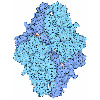 |
Beta-galactosidase
June 2016 Beta-galactosidase is a powerful tool for genetic engineering of bacteria |
 |
Biodegradable Plastic
December 2017 Bacteria build biodegradable plastic that could be better for the environment |
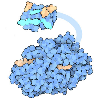 |
Cellulases and Bioenergy
May 2023 Powerful fungal enzymes break down cellulose during industrial production of ethanol from plant material. |
 |
Citrate Synthase
September 2007 Citrate synthase opens and closes around its substrates as part of the citric acid cycle |
 |
Citric Acid Cycle
October 2012 Eight enzymes form a cyclic pathway for energy production and biosynthesis |
 |
Complex I
December 2011 A proton-pumping protein complex performs the first step of the respiratory electron transport chain |
 |
Cytochrome bc1
May 2011 A flow of electrons powers proton pumps in cellular respiration and photosynthesis |
 |
Cytochrome c
December 2002 Cytochrome c shuttles electrons during the production of cellular energy |
 |
Cytochrome c Oxidase
May 2000 Cytochrome oxidase extracts energy from food using oxygen |
 |
Fatty Acid Synthase
June 2007 Fatty acids are constructed in many sequential steps by a large protein complex |
 |
GFP-like Proteins
June 2014 GFP-like proteins found in nature or engineered in the laboratory now span every color of the rainbow |
 |
Glycogen Phosphorylase
December 2001 Glycogen phosphorylase releases sugar from its cellular storehouse |
 |
Glycolytic Enzymes
February 2004 The ten enzymes of glycolysis break down sugar in our diet |
 |
Green Fluorescent Protein (GFP)
June 2003 A tiny fluorescent protein from jellyfish has revolutionized cell biology |
 |
Hypoxia-Inducible Factors
December 2019 HIF-α is a molecular switch that responds to changing oxygen levels. |
 |
Isocitrate Dehydrogenase
September 2010 Atomic structures have revealed the catalytic steps of a citric acid cycle enzyme |
 |
Lactate Dehydrogenase
June 2008 Our cells temporarily build lactate when supplies of oxygen are low |
 |
Luciferase
June 2006 Organisms from fireflies to bacteria use luciferase to emit light |
 |
Myoglobin
January 2000 Myoglobin was the first protein to have its atomic structure determined, revealing how it stores oxygen in muscle cells. |
 |
Photosynthetic Supercomplexes
April 2020 Light is captured by huge supercomplexes of photosystems and antenna systems. |
 |
Photosystem I
October 2001 Photosystem I captures the energy in sunlight |
 |
Phototropin
March 2015 Phototrophins sense the level of blue light, allowing plants to respond to changing environmental conditions |
 |
Pyruvate Dehydrogenase Complex
September 2012 A huge molecular complex links three sequential reactions for energy production |
 |
Pyruvate Kinase M2
June 2022 Pyruvate kinases are the paradoxical gatekeepers for cancer cell metabolism and growth. |
 |
Respiratory Supercomplex
September 2022 In our mitochondria, three electron-transport complexes assemble into a supercomplex. |
 |
Rhodopsin
March 2012 In our eyes, rhodopsin uses the molecule retinal to see light |
 |
Trypsin
October 2003 An activated serine amino acid in trypsin cleaves protein chains |
Biology of Plants - plant cells build molecular machines for photosynthesis, infrastructure and communication, and protection (26)
 |
Acetohydroxyacid Synthase
November 2021 In plants, AHAS performs the first step in synthesis of three essential amino acids, making it an effective target for herbicides. |
 |
Auxin and TIR1 Ubiquitin Ligase
February 2009 The plant hormone auxin controls growth and response to light and gravity |
 |
Bacteriorhodopsin
March 2002 Bacteriorhodopsin pumps protons powered by green sunlight |
 |
Carbon Capture Mechanisms
September 2024 Scientists are studying cyanobacteria to improve the productivity of agricultural crops |
 |
Carbonic Anhydrase
January 2004 Carbonic anhydrase solubilizes carbon dioxide gas so we can breathe it out |
 |
Carotenoid Oxygenase
June 2005 Light-sensing retinal molecules are built from colorful carotenoids in our diet |
 |
Cellulose Synthase
February 2021 Plants build tough cellulose strands one sugar at a time. |
 |
Concanavalin A and Circular Permutation
April 2010 For some proteins, clipped and reassembled sequences can produce the same 3D shape |
 |
Cytochrome bc1
May 2011 A flow of electrons powers proton pumps in cellular respiration and photosynthesis |
 |
EPSP Synthase and Weedkillers
February 2018 The weedkiller Roundup attacks a key enzyme involved in the construction of aromatic compounds. |
 |
Fatty Acid Synthase
June 2007 Fatty acids are constructed in many sequential steps by a large protein complex |
 |
Green Fluorescent Protein (GFP)
June 2003 A tiny fluorescent protein from jellyfish has revolutionized cell biology |
 |
Isoprene Synthase
September 2016 Plants release a billion metric tons of isoprene and other organic gases every year. |
 |
Monellin
July 2016 Monellin and other supersweet proteins trick our taste receptors. |
 |
Nitrogenase
February 2002 Nitrogenase uses an exotic cluster of metals to fix atmospheric nitrogen into bioavailable ammonia |
 |
Photosynthetic Supercomplexes
April 2020 Light is captured by huge supercomplexes of photosystems and antenna systems. |
 |
Photosystem I
October 2001 Photosystem I captures the energy in sunlight |
 |
Photosystem II
November 2004 Photosystem II captures the energy from sunlight and uses it to extract electrons from water molecules |
 |
Phototropin
March 2015 Phototrophins sense the level of blue light, allowing plants to respond to changing environmental conditions |
 |
Phytohormone Receptor DWARF14
October 2022 Some phytohormones mobilize the cell’s protein degradation machinery to regulate plant growth and development. |
 |
Phytosulfokine Receptor
August 2020 Phytosulfokine and other small peptides deliver signals about growth and development in plants. |
 |
Ricin
May 2013 The structure of ricin reveals how it kills cells and how vaccines can produce immunity against ricin poisoning |
 |
Rubisco
November 2000 Rubisco fixes atmospheric carbon dioxide into bioavailable sugar molecules |
 |
TAL Effectors
December 2014 TAL-effectors are modular, DNA-reading proteins that can be used to edit DNA in living cells |
 |
TOC-TIC Translocon
May 2025 The large TOC-TIC supercomplex transports proteins into the chloroplast |
 |
ZAR1 Resistosome
November 2023 Plants protect themselves from infection with immune system machines such as the resistosome |
Bioluminescence and Fluorescence - proteins that shape light (3)
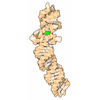 |
Fluorescent RNA Aptamers
January 2019 RNA aptamers are being engineered to track molecules inside living cells |
 |
GFP-like Proteins
June 2014 GFP-like proteins found in nature or engineered in the laboratory now span every color of the rainbow |
 |
Green Fluorescent Protein (GFP)
June 2003 A tiny fluorescent protein from jellyfish has revolutionized cell biology |
Cellular Signaling - sending and receiving molecular messages (57)
 |
Acetylcholine Receptor
November 2005 The neurotransmitter acetylcholine opens a protein channel, stimulating muscle contraction |
 |
Acetylcholinesterase
June 2004 Acetylcholinesterase stops the signal between a nerve cell and a muscle cell |
 |
Adenylyl Cyclase
November 2020 Adenylyl cyclase creates second messengers to amplify signals from G-protein coupled receptors |
 |
Adrenergic Receptors
April 2008 Adrenaline stimulates a G-protein-coupled receptor, priming us for action |
 |
AMPA Receptor
July 2019 Receptors for the neurotransmitter glutamate in our brain come in several shapes and sizes. |
 |
Anabolic Steroids
August 2007 Anabolic steroids like testosterone are among the most common performance enhancing drugs |
 |
Anaphase-Promoting Complex / Cyclosome
March 2023 APC/C guards the checkpoints that regulate key steps in the cell cycle |
 |
Angiotensin and Blood Pressure
October 2024 Many medications for controlling high blood pressure inhibit the action of the peptide hormone angiotensin. |
 |
ATM and ATR Kinases
August 2023 Dividing cells use ATM and ATR kinases to respond to DNA damage. |
 |
Auxin and TIR1 Ubiquitin Ligase
February 2009 The plant hormone auxin controls growth and response to light and gravity |
 |
c-Abl Protein Kinase and Imatinib
July 2023 Protein kinases are being targeted by new anti-cancer drugs |
 |
Calcium Pump
March 2004 Atomic structures have captured the calcium pump in action |
 |
Calmodulin
August 2003 Calcium ions rapidly deliver signals to control processes such as muscle contraction, nerve signaling, and fertilization |
 |
cAMP-dependent Protein Kinase (PKA)
August 2012 PKA delivers cellular signals by adding phosphates to proteins |
 |
Capsaicin Receptor TRPV1
October 2020 TRPV1 is an ion channel that senses heat and contributes to pain sensation. |
 |
Cyclin and Cyclin-dependent Kinase
August 2019 Cyclins and cyclin-dependent kinases control when cells divide, making them important targets for cancer therapy. |
 |
Cyclooxygenase
May 2001 Aspirin attacks an important enzyme in pain signaling and blood clotting |
 |
Designer Insulins
February 2016 Engineered insulins have been developed to improve treatment of diabetes |
 |
Dipeptidyl Peptidase 4
October 2016 Inhibitors of dipeptidyl peptidase 4 are used to treat type-2 diabetes |
 |
Epidermal Growth Factor
June 2010 EGF is part of a family of proteins that controls aspects of cell growth and development |
 |
Estrogen Receptor
September 2003 Estrogen binds to receptors in the nucleus and affects key genes in development |
 |
G Proteins
October 2004 G proteins receive signals from cellular receptors and deliver them inside the cell |
 |
Glucagon
April 2015 Glucagon triggers the release of glucose into the blood, to power cells throughout the body |
| Glucocorticoid Receptor and Dexamethasone
June 2021 An anti-inflammatory drug has given us a new way to fight the COVID-19 pandemic. |
|
 |
Glutamate-gated Chloride Receptors
November 2015 The antibiotic ivermectin attacks glutamate-gated chloride channels, paralyzing parasitic worms. |
 |
Growth Hormone
April 2004 Growth hormone brings together two copies of its cellular receptor |
 |
HER2/neu and Trastuzumab
April 2022 Trastuzumab monoclonal antibodies targeting HER2 receptors are at the forefront of breast cancer treatment |
 |
Insulin
February 2001 The hormone insulin helps control the level of glucose in the blood |
 |
Insulin Receptor
February 2015 The cellular receptor for insulin helps control the utilization of glucose by cells |
 |
Interferons
August 2010 Interferons mobilize defenses against viral infection |
 |
Leptin
May 2012 Problems with the appetite-controlling hormone leptin can lead to obesity |
 |
Mechanosensitive Channels
November 2008 Pressure-sensitive channels open when the internal pressure of a cell gets too high |
 |
Neurotransmitter Transporters
March 2014 Neurotransmitters are transported out of nerve synapses to end a signal transmission |
 |
Neurotrophins
August 2005 Neurotrophins guide the development of the nervous system |
 |
Nicotine, Cancer, and Addiction
May 2022 Nicotine causes addiction by interacting with receptors in the brain |
 |
Nitric Oxide Synthase
January 2011 Nitric oxide gas is used as a rapid-acting hormone and as a powerful defense |
 |
Odorant Receptors
June 2023 Our sense of smell relies on odorant receptors that recognize specific scents. |
 |
Opioid Receptors
January 2018 Morphine and other opioid drugs bind to receptors in the nervous system, controlling pain |
 |
PD-1 (Programmed Cell Death Protein 1)
December 2016 PD-1 and its ligands are a new target for cancer therapy |
 |
Photoactive Yellow Protein
March 2017 Researchers use synchrotrons and X-ray lasers to reveal the rapid processes of light sensing. |
 |
Phototropin
March 2015 Phototrophins sense the level of blue light, allowing plants to respond to changing environmental conditions |
 |
Phytohormone Receptor DWARF14
October 2022 Some phytohormones mobilize the cell’s protein degradation machinery to regulate plant growth and development. |
 |
Phytosulfokine Receptor
August 2020 Phytosulfokine and other small peptides deliver signals about growth and development in plants. |
 |
Piezo1 Mechanosensitive Channel
July 2018 Mechanosensitive ion channels give our cells a sense of touch. |
 |
Potassium Channels
February 2003 Potassium channels allow potassium ions to pass, but block smaller sodium ions |
 |
RAF Protein Kinases
March 2016 A single mutation in a RAF protein kinase can help transform a normal cell into a cancer cell. |
 |
Ras Protein
April 2012 Mutation of the growth-controlling ras protein can lead to cancer |
 |
Receptor for Advanced Glycation End Products
June 2015 RAGE recognizes sugar-modified proteins, contributing to an inflammatory response that plays a role in diabetes |
 |
Rhodopsin
March 2012 In our eyes, rhodopsin uses the molecule retinal to see light |
 |
Serotonin Receptor
August 2013 Serotonin receptors control mood, emotion, and many other behaviors, and are targets for many important drugs |
 |
SNARE Proteins
November 2013 SNARE proteins power the fusion of vesicles with membranes by forming a bundle of alpha helices |
 |
Src Tyrosine Kinase
July 2003 Growth signaling proteins play an important role in the development of cancer |
 |
Tissue Factor
March 2006 Tissue factor senses damage to the body and triggers formation of a blood clot |
 |
Two-component Systems
October 2015 Bacteria respond to their environment with two-component sensing systems. |
 |
Vascular Endothelial Growth Factor (VegF) and Angiogenesis
March 2022 VegF promotes blood vessel formation (angiogenesis), affecting cancer proliferation, wound healing, and other bodily processes. |
 |
Vitamin D Receptor
November 2012 Vitamin D helps regulate the use of calcium throughout the body |
 |
Voltage-gated Sodium Channels
March 2020 Voltage-gated sodium channels transmit signals in a wave through the nervous system. |
Central Dogma - transferring information from genes to proteins (13)
 |
Aminoacyl-tRNA Synthetases
April 2001 Aminoacyl-tRNA synthetases ensure that the proper amino acids are used to build proteins |
 |
Cisplatin and DNA
March 2021 Cisplatin treats cancer by causing damage to the DNA of cancer cells. |
 |
DNA
November 2001 Atomic structures reveal how the iconic double helix encodes genomic information |
 |
DNA Polymerase
March 2000 DNA polymerase makes an accurate copy of the cell's genome |
 |
Expressome
January 2021 In bacteria, ribosomes start building proteins as messenger RNA is being transcribed |
 |
Histone Deacetylases
September 2023 Histone deacetylases regulate access to genetic information by modifying histones |
 |
Mediator
January 2024 Mediator integrates regulatory information to decide when genes need to be transcribed. |
 |
Non-Homologous End Joining Supercomplexes
July 2022 Lethal double-strand breaks in the DNA genome are repaired by NHEJ |
 |
Ribosome
January 2010 Ribosomes are complex molecular machines that build proteins |
 |
RNA Polymerase
April 2003 RNA polymerase transcribes genetic information from DNA into RNA |
 |
SARS-CoV-2 RNA-dependent RNA Polymerase
September 2020 Coronaviruses duplicate their RNA genome using a specialized polymerase |
 |
Spliceosomes
May 2020 Cryoelectron microscropy is revealing how spliceosomes cut-and-paste messenger RNA molecules. |
 |
Transfer RNA
March 2001 Transfer RNA translates the language of the genome into the language of proteins |
Enzymes - the cell's chemists (72)
 |
AAA+ Proteases
August 2006 AAA+ proteases are ATP-powered molecular motors that thread protein chains through a hole |
 |
ABO Blood Type Glycosyltransferases
December 2012 ABO blood types are determined by an enzyme that attaches sugars to proteins |
 |
Acetohydroxyacid Synthase
November 2021 In plants, AHAS performs the first step in synthesis of three essential amino acids, making it an effective target for herbicides. |
 |
Acetylcholinesterase
June 2004 Acetylcholinesterase stops the signal between a nerve cell and a muscle cell |
 |
Aconitase and Iron Regulatory Protein 1
May 2007 Aconitase performs a reaction in the citric acid cycle, and moonlights as a regulatory protein |
 |
Alcohol Dehydrogenase
January 2001 Alcohol dehydrogenase detoxifies the ethanol we drink |
 |
Alpha-amylase
February 2006 Amylases digest starch to produce glucose |
 |
Aminoacyl-tRNA Synthetases
April 2001 Aminoacyl-tRNA synthetases ensure that the proper amino acids are used to build proteins |
 |
Anabolic Steroids
August 2007 Anabolic steroids like testosterone are among the most common performance enhancing drugs |
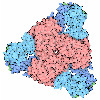 |
Aspartate Transcarbamoylase
November 2017 Key biosynthetic enzymes are regulated by their ultimate products through allosteric motions. |
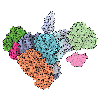 |
Assembly Line Polyketide Synthases
January 2025 Large multienzyme complexes that synthesize diverse small molecules in a stepwise manner. |
 |
Beta-galactosidase
June 2016 Beta-galactosidase is a powerful tool for genetic engineering of bacteria |
 |
Beta-secretase
July 2009 Beta-secretase trims proteins in the cell and plays an important role in Alzheimer's disease |
 |
cAMP-dependent Protein Kinase (PKA)
August 2012 PKA delivers cellular signals by adding phosphates to proteins |
 |
Carbonic Anhydrase
January 2004 Carbonic anhydrase solubilizes carbon dioxide gas so we can breathe it out |
 |
Carotenoid Oxygenase
June 2005 Light-sensing retinal molecules are built from colorful carotenoids in our diet |
 |
Caspases
August 2004 Caspases disassemble proteins during the process of programmed cell death |
 |
Catalase
September 2004 Catalase protects us from dangerous reactive oxidizing molecules |
 |
Citrate Synthase
September 2007 Citrate synthase opens and closes around its substrates as part of the citric acid cycle |
 |
Citric Acid Cycle
October 2012 Eight enzymes form a cyclic pathway for energy production and biosynthesis |
 |
Cyclooxygenase
May 2001 Aspirin attacks an important enzyme in pain signaling and blood clotting |
 |
Cytochrome p450
October 2006 Cytochrome p450 detoxifies and solubilizes drugs and poisons by modifying them with oxygen |
 |
Dehalogenases
April 2018 Bacteria destroy toxic environmental pollutants that include chlorine or bromine atoms. |
 |
Dihydrofolate Reductase
October 2002 DHFR is a target for cancer chemotherapy and bacterial infection |
 |
DNA Ligase
July 2004 DNA ligase reconnects broken DNA strands, and is used to engineer recombinant DNA |
 |
EPSP Synthase and Weedkillers
February 2018 The weedkiller Roundup attacks a key enzyme involved in the construction of aromatic compounds. |
 |
Exosomes
February 2007 Exosomes destroy messenger RNA molecules after they have finished their jobs |
 |
Fatty Acid Synthase
June 2007 Fatty acids are constructed in many sequential steps by a large protein complex |
 |
Glucansucrase
June 2011 Bacteria adhere to our teeth by building sticky sugar chains |
 |
Glucose Oxidase
May 2006 Glucose oxidase measures blood glucose level in biosensors |
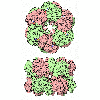 |
Glutamine Synthetase
June 2002 Glutamine synthetase monitors the levels of nitrogen-rich amino acids and decides when to make more |
 |
Glycogen Phosphorylase
December 2001 Glycogen phosphorylase releases sugar from its cellular storehouse |
 |
Glycolytic Enzymes
February 2004 The ten enzymes of glycolysis break down sugar in our diet |
 |
HIV Reverse Transcriptase
September 2002 HIV builds a DNA copy of its RNA genome, providing a unique target for drug therapy |
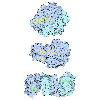 |
Hydrogenase
March 2009 Hydrogenases use unusual metal ions to split hydrogen gas |
 |
Hypoxanthine-guanine phosphoribosyltransferase (HGPRT)
July 2012 Cells salvage and recycle their obsolete DNA and RNA |
 |
Isocitrate Dehydrogenase
September 2010 Atomic structures have revealed the catalytic steps of a citric acid cycle enzyme |
 |
Lactate Dehydrogenase
June 2008 Our cells temporarily build lactate when supplies of oxygen are low |
 |
Legumain
August 2018 Legumain cleaves proteins, and can also put them back together. |
 |
Luciferase
June 2006 Organisms from fireflies to bacteria use luciferase to emit light |
 |
Lysozyme
September 2000 Lysozyme attacks the cell walls of bacteria |
 |
Methyl-coenzyme M Reductase
November 2014 Methanogens use sophisticated molecular tools to build methane |
 |
New Delhi Metallo-Beta-Lactamase
July 2015 Antibiotics can save lives, but antibiotic-resistant strains of bacteria pose a dangerous threat |
 |
Nitrogenase
February 2002 Nitrogenase uses an exotic cluster of metals to fix atmospheric nitrogen into bioavailable ammonia |
 |
O-GlcNAc Transferase
September 2011 Some protein functions are regulated when sugars are attached |
 |
Oxidosqualene Cyclase
December 2007 Oxidosqualine cyclase forms the unusual fused rings of cholesterol molecules |
 |
Pepsin
December 2000 Pepsin digests proteins in strong stomach acid |
 |
Phenylalanine Hydroxylase
January 2005 An unusual cofactor is used in the synthesis of aromatic amino acids |
 |
Phytase
September 2018 Phytase is used in agriculture to mobilize indigestible phosphate compounds in livestock feed. |
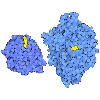 |
Plastic-eating Enzymes
January 2023 Researchers are looking to Nature to find ways to dispose of discarded plastic. |
 |
Poly(A) Polymerase
October 2008 Poly(A) polymerase adds a long tail of adenine nucleotides at the end of messenger RNA |
 |
Pyruvate Dehydrogenase Complex
September 2012 A huge molecular complex links three sequential reactions for energy production |
 |
Restriction Enzymes
August 2000 Bacterial enzymes that cut DNA are useful tools for genetic engineering |
 |
Rhomboid Protease GlpG
August 2011 Some proteases cut proteins embedded in cell membranes |
 |
Ribonuclease A
September 2008 Ribonuclease cuts and controls RNA |
 |
Ribonucleotide Reductase
October 2019 Ribonucleotide reductase creates the building blocks of DNA |
 |
Ribosome
January 2010 Ribosomes are complex molecular machines that build proteins |
 |
RNA Polymerase
April 2003 RNA polymerase transcribes genetic information from DNA into RNA |
 |
Rubisco
November 2000 Rubisco fixes atmospheric carbon dioxide into bioavailable sugar molecules |
 |
Selenocysteine Synthase
August 2008 Selenium is used in place of sulfur to build proteins for special tasks |
 |
Self-splicing RNA
May 2005 Special sequences of RNA are able to splice themselves |
 |
Src Tyrosine Kinase
July 2003 Growth signaling proteins play an important role in the development of cancer |
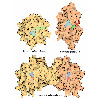 |
Sulfotransferases
August 2009 Sulfotransferases transfer sulfuryl groups in enzymatic reactions |
 |
Superoxide Dismutase
October 2007 Superoxide dismutase protects us from dangerously reactive forms of oxygen |
 |
Tetrahydrobiopterin Biosynthesis
August 2015 Tetrahydrobiopterin plays an essential role in the production of aromatic amino acids, neurotransmitters and nitric oxide. |
 |
Thrombin
January 2002 Thrombin activates the molecule that forms blood clots |
 |
Thymine Dimers
July 2007 Ultraviolet light damages our DNA, but our cells have ways to correct the damage |
 |
Tissue Transglutaminase and Celiac Disease
May 2017 Tissue transglutaminase staples proteins together by forming a chemical crosslink. |
 |
Topoisomerases
January 2006 Topoisomerases untangle and reduce the tension of DNA strands in the cell |
 |
Transposase
December 2006 Transposases shift genes around in the genome |
 |
Trypsin
October 2003 An activated serine amino acid in trypsin cleaves protein chains |
 |
Xanthine Oxidoreductase
September 2009 Xanthine oxidoreductase helps break down obsolete purine nucleotides |
Molecular Evolution - mechanisms for the rise of life on Earth (15)
 |
Antifreeze Proteins
December 2009 Small antifreeze proteins protect cells from damage by ice |
 |
Concanavalin A and Circular Permutation
April 2010 For some proteins, clipped and reassembled sequences can produce the same 3D shape |
 |
Cytochrome c
December 2002 Cytochrome c shuttles electrons during the production of cellular energy |
 |
Cytochrome c Oxidase
May 2000 Cytochrome oxidase extracts energy from food using oxygen |
 |
Dihydrofolate Reductase
October 2002 DHFR is a target for cancer chemotherapy and bacterial infection |
 |
Directed Evolution of Enzymes
December 2018 Biological evolution is being harnessed in the lab to create new enzymes. |
 |
Globin Evolution
February 2017 The mechanisms of molecular evolution are revealed in globin sequences and structures. |
 |
Luciferase
June 2006 Organisms from fireflies to bacteria use luciferase to emit light |
 |
Parvoviruses
May 2010 Viruses that cause distemper are surrounded by an icosahedral capsid |
 |
Penicillin-binding Proteins
May 2002 Penicillin attacks the proteins that build bacterial cell walls |
 |
Ribosome
January 2010 Ribosomes are complex molecular machines that build proteins |
 |
Ribosome Diversity
July 2024 By comparing the structures of ribosomes from different organisms, we can explore the evolution of life. |
 |
Transposase
December 2006 Transposases shift genes around in the genome |
 |
Vancomycin
December 2015 The antibiotic vancomycin blocks the construction of bacterial cell walls. |
 |
Vitamin D Receptor
November 2012 Vitamin D helps regulate the use of calcium throughout the body |
Molecular Infrastructure - supporting cells, tissues and organisms (14)
 |
Actin
July 2001 Cells are supported by a cytoskeleton of protein filaments |
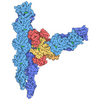 |
Actin Branching by Arp2/3 Complex
November 2022 By mimicking actin, Arp2/3 complex helps build a complex cytoskeleton that supports and shapes cells. |
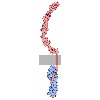 |
Cadherin
March 2008 Adhesive cadherin proteins hold neighboring cells together |
 |
Cellulose Synthase
February 2021 Plants build tough cellulose strands one sugar at a time. |
 |
Collagen
April 2000 Sturdy fibers of collagen give structure to our bodies |
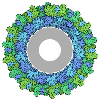 |
ESCRT-III
August 2024 ESCRT-III forms helical assemblies that remodel cellular membranes |
 |
Hyaluronidases
March 2024 Long carbohydrate chains are used to make our bodies flexible and resilient. |
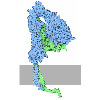 |
Integrin
February 2011 Integrins forge flexible linkages between the infrastructure inside and outside of cells |
 |
Microtubules
July 2014 The largest filaments of the cytoskeleton provide tracks for transport throughout the cell |
 |
Pilus Machine
July 2017 A molecular machine with a rotary motor builds a long protein filament involved in bacterial motility and attachment. |
 |
Proteins and Biominerals
April 2019 Small biomineral crystals are used to build bone, eggshells and even tiny compasses. |
 |
Tissue Transglutaminase and Celiac Disease
May 2017 Tissue transglutaminase staples proteins together by forming a chemical crosslink. |
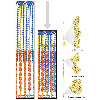 |
Titin
May 2015 The giant protein titin organizes the structure of muscle and gives them elasticity |
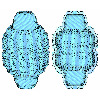 |
Vaults
June 2009 Cells build huge vault containers constructed of a symmetric arrangement of many subunits |
Molecular Motors - directed motion at the molecular level (8)
 |
ATP Synthase
December 2005 ATP synthase links two rotary motors to generate ATP |
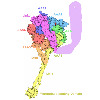 |
Dynein
August 2014 The motor protein dynein transports cellular cargo along microtubules |
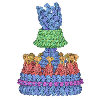 |
Flagellar Motor
December 2024 Bidirectional motors power the swimming of many bacterial cells. |
 |
Kinesin
April 2005 The motor protein kinesin carries cellular cargo along microtubules |
 |
Myosin
June 2001 Molecular motors fueled by ATP power the contraction of muscles |
 |
Pilus Machine
July 2017 A molecular machine with a rotary motor builds a long protein filament involved in bacterial motility and attachment. |
 |
TOC-TIC Translocon
May 2025 The large TOC-TIC supercomplex transports proteins into the chloroplast |
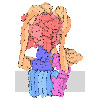 |
Vacuolar ATPase
March 2018 Two linked molecular motors are used to pump protons across membranes. |
Molecules for a Sustainable Future - proteins with global impact (13)
 |
Biodegradable Plastic
December 2017 Bacteria build biodegradable plastic that could be better for the environment |
 |
Carbon Capture Mechanisms
September 2024 Scientists are studying cyanobacteria to improve the productivity of agricultural crops |
 |
Cellulose Synthase
February 2021 Plants build tough cellulose strands one sugar at a time. |
 |
Dehalogenases
April 2018 Bacteria destroy toxic environmental pollutants that include chlorine or bromine atoms. |
 |
Glutathione Transferases
August 2017 Glutathione transferase tags toxic molecules, making them easy to recognize and remove. |
 |
Isoprene Synthase
September 2016 Plants release a billion metric tons of isoprene and other organic gases every year. |
 |
Methyl-coenzyme M Reductase
November 2014 Methanogens use sophisticated molecular tools to build methane |
 |
Nitrogenase
February 2002 Nitrogenase uses an exotic cluster of metals to fix atmospheric nitrogen into bioavailable ammonia |
 |
Photosystem I
October 2001 Photosystem I captures the energy in sunlight |
 |
Photosystem II
November 2004 Photosystem II captures the energy from sunlight and uses it to extract electrons from water molecules |
 |
Phytase
September 2018 Phytase is used in agriculture to mobilize indigestible phosphate compounds in livestock feed. |
 |
Phytohormone Receptor DWARF14
October 2022 Some phytohormones mobilize the cell’s protein degradation machinery to regulate plant growth and development. |
 |
Plastic-eating Enzymes
January 2023 Researchers are looking to Nature to find ways to dispose of discarded plastic. |
Nucleic Acids - storing genetic information and more (20)
 |
Adenine Riboswitch in Action
June 2017 XFEL serial crystallography reveals what happens when adenine binds to a riboswitch |
 |
ATM and ATR Kinases
August 2023 Dividing cells use ATM and ATR kinases to respond to DNA damage. |
 |
Designed DNA Crystal
November 2009 Small pieces of DNA have been engineered to form a nanoscale lattice |
 |
DNA
November 2001 Atomic structures reveal how the iconic double helix encodes genomic information |
 |
Fluorescent RNA Aptamers
January 2019 RNA aptamers are being engineered to track molecules inside living cells |
 |
Nucleosome
July 2000 The cell's genome is stored and protected by nucleosomes |
 |
RecA and Rad51
April 2014 Broken DNA strands may be repaired by matching sequences in a duplicate copy of the DNA |
 |
Restriction Enzymes
August 2000 Bacterial enzymes that cut DNA are useful tools for genetic engineering |
 |
Ribonuclease P
August 2021 The ribozyme ribonuclease P cleaves pre-tRNA to form functional tRNA. |
 |
Ribosomal Subunits
October 2000 Atomic structures of the ribosomal subunits reveal a central role for RNA in protein synthesis |
 |
Ribosome
January 2010 Ribosomes are complex molecular machines that build proteins |
 |
Riboswitches
October 2010 Special sequences of messenger RNA can bind to regulatory molecules and affect synthesis of proteins |
 |
Self-splicing RNA
May 2005 Special sequences of RNA are able to splice themselves |
 |
Small Interfering RNA (siRNA)
February 2008 Our cells continually look for pieces of double-stranded RNA, a possible sign of viral infection |
 |
Spliceosomes
May 2020 Cryoelectron microscropy is revealing how spliceosomes cut-and-paste messenger RNA molecules. |
 |
Telomerase
November 2018 Telomerase maintains the ends of our chromosomes. |
 |
Thymine Dimers
July 2007 Ultraviolet light damages our DNA, but our cells have ways to correct the damage |
 |
Transfer RNA
March 2001 Transfer RNA translates the language of the genome into the language of proteins |
 |
Transfer-Messenger RNA
January 2013 tmRNA rescues ribosomes that are stalled by damaged messenger RNA |
 |
Vitamin D Receptor
November 2012 Vitamin D helps regulate the use of calcium throughout the body |
Protein Synthesis - building the molecules of life (55)
 |
AAA+ Proteases
August 2006 AAA+ proteases are ATP-powered molecular motors that thread protein chains through a hole |
 |
Aconitase and Iron Regulatory Protein 1
May 2007 Aconitase performs a reaction in the citric acid cycle, and moonlights as a regulatory protein |
 |
Adenine Riboswitch in Action
June 2017 XFEL serial crystallography reveals what happens when adenine binds to a riboswitch |
 |
Aminoacyl-tRNA Synthetases
April 2001 Aminoacyl-tRNA synthetases ensure that the proper amino acids are used to build proteins |
 |
Cascade and CRISPR
January 2015 Cascade and CRISPR help bacteria remember how to fight viral infection |
 |
Catabolite Activator Protein
December 2003 CAP senses the level of sugar and mobilizes the proteins needed to utilize it |
 |
Chaperones
August 2002 Chaperones help new proteins fold into their proper shape |
 |
DNA
November 2001 Atomic structures reveal how the iconic double helix encodes genomic information |
 |
DNA Helicase
December 2013 DNA helicase pries apart the two strands in a DNA double helix, powered by ATP |
 |
DNA Ligase
July 2004 DNA ligase reconnects broken DNA strands, and is used to engineer recombinant DNA |
 |
DNA Methyltransferases
July 2011 Cells add methyl groups to their DNA to encode additional epigenetic information |
 |
DNA Polymerase
March 2000 DNA polymerase makes an accurate copy of the cell's genome |
 |
Elongation Factors
September 2006 Protein synthesis requires the assistance of several elongation factors that guide each step |
 |
Enhanceosome
February 2010 Enhanceosomes help decide the appropriate time to transcribe a gene |
 |
Estrogen Receptor
September 2003 Estrogen binds to receptors in the nucleus and affects key genes in development |
 |
Exosomes
February 2007 Exosomes destroy messenger RNA molecules after they have finished their jobs |
 |
Expressome
January 2021 In bacteria, ribosomes start building proteins as messenger RNA is being transcribed |
 |
Hemoglobin
May 2003 Hemoglobin uses a change in shape to increase the efficiency of oxygen transport |
 |
HIV Reverse Transcriptase
September 2002 HIV builds a DNA copy of its RNA genome, providing a unique target for drug therapy |
 |
Hsp90
December 2008 Heat shock proteins ensure that proteins remain folded and active under harsh conditions |
 |
Initiation Factor eIF4E
February 2019 Initiation factors for protein synthesis interact through disordered chains. |
 |
Inteins
November 2010 Inteins splice themselves out of larger protein chains |
 |
lac Repressor
March 2003 A genetic circuit controls the production of lactose-utilizing enzymes in bacteria |
 |
Lysozyme
September 2000 Lysozyme attacks the cell walls of bacteria |
 |
Mediator
January 2024 Mediator integrates regulatory information to decide when genes need to be transcribed. |
 |
Messenger RNA Capping
January 2012 Messenger RNA molecules are capped with an inverted nucleotide |
 |
Nucleosome
July 2000 The cell's genome is stored and protected by nucleosomes |
 |
O-GlcNAc Transferase
September 2011 Some protein functions are regulated when sugars are attached |
 |
Oct and Sox Transcription Factors
April 2009 Transcription factors decide when particular genes will be transcribed |
 |
Oligosaccharyltransferase
February 2022 Oligosaccharyltransferase adds a protective coat of carbohydrates to proteins. |
 |
p53 Tumor Suppressor
July 2002 p53 tumor suppressor protects the body from DNA damage and cancer |
 |
Poly(A) Polymerase
October 2008 Poly(A) polymerase adds a long tail of adenine nucleotides at the end of messenger RNA |
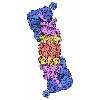 |
Proteasome
October 2013 Proteasomes destroy damaged or obsolete proteins inside cells |
 |
RecA and Rad51
April 2014 Broken DNA strands may be repaired by matching sequences in a duplicate copy of the DNA |
 |
Restriction Enzymes
August 2000 Bacterial enzymes that cut DNA are useful tools for genetic engineering |
 |
Rhomboid Protease GlpG
August 2011 Some proteases cut proteins embedded in cell membranes |
 |
Ribonuclease P
August 2021 The ribozyme ribonuclease P cleaves pre-tRNA to form functional tRNA. |
 |
Ribosomal Subunits
October 2000 Atomic structures of the ribosomal subunits reveal a central role for RNA in protein synthesis |
 |
Ribosome
January 2010 Ribosomes are complex molecular machines that build proteins |
 |
Ribosome Diversity
July 2024 By comparing the structures of ribosomes from different organisms, we can explore the evolution of life. |
 |
Riboswitches
October 2010 Special sequences of messenger RNA can bind to regulatory molecules and affect synthesis of proteins |
 |
RNA Polymerase
April 2003 RNA polymerase transcribes genetic information from DNA into RNA |
 |
Selenocysteine Synthase
August 2008 Selenium is used in place of sulfur to build proteins for special tasks |
 |
Self-splicing RNA
May 2005 Special sequences of RNA are able to splice themselves |
 |
Sirtuins
September 2017 Sirtuin activation is being explored as a way to slow aging. |
 |
Sliding Clamps
June 2012 Sliding clamps slide along DNA strands and keep DNA polymerase on track during replication |
 |
Small Interfering RNA (siRNA)
February 2008 Our cells continually look for pieces of double-stranded RNA, a possible sign of viral infection |
 |
TATA-Binding Protein
July 2005 TATA protein tells RNA polymerase where to get started on a gene |
 |
Thymine Dimers
July 2007 Ultraviolet light damages our DNA, but our cells have ways to correct the damage |
 |
Topoisomerases
January 2006 Topoisomerases untangle and reduce the tension of DNA strands in the cell |
 |
Transfer RNA
March 2001 Transfer RNA translates the language of the genome into the language of proteins |
 |
Transfer-Messenger RNA
January 2013 tmRNA rescues ribosomes that are stalled by damaged messenger RNA |
 |
Transposase
December 2006 Transposases shift genes around in the genome |
 |
Ubiquitin
December 2004 Ubiquitin is used to tag obsolete proteins for destruction |
 |
Zinc Fingers
March 2007 Zinc ions are used to strengthen small protein modules that recognize DNA |
Transport - delivering the cell's resources (24)
 |
Aminopeptidase 1 and Autophagy
November 2016 Aminopeptidase 1 is delivered inside the cell using the machinery of autophagy |
 |
Anabolic Steroids
August 2007 Anabolic steroids like testosterone are among the most common performance enhancing drugs |
 |
Aquaporin
May 2014 Aquaporins create a channel for water molecules to cross through cell membranes |
 |
CFTR and Cystic Fibrosis
May 2024 Cystic fibrosis is currently treated using drugs that enhance the function of mutated CFTR |
 |
Clathrin
April 2007 Three-armed clathrin triskelions are used to build molecular cages involved in transport |
 |
Erythrocruorin
March 2013 Earthworms build a huge version of hemoglobin to carry oxygen |
 |
Ferritin and Transferrin
November 2002 Ferritin and transferrin manage our essential stores of iron ions |
 |
Fetal Hemoglobin
May 2021 Fetal hemoglobin allows a growing fetus to receive oxygen from their mother. |
 |
Glucose Transporters
April 2017 Glucose transporters deliver glucose molecules one-by-one across cell membranes. |
 |
Golgi Casein Kinase
January 2022 Casein and many other secreted proteins are phosphorylated by Golgi casein kinase |
 |
Hemoglobin
May 2003 Hemoglobin uses a change in shape to increase the efficiency of oxygen transport |
 |
Importins
January 2007 Importins deliver proteins into the nucleus through the nuclear pore complex |
 |
Injectisome
June 2024 Salmonella bacteria inject a cocktail of effector proteins into cells to disable their defenses. |
 |
Multidrug Resistance Transporters
November 2007 Many bacteria use multidrug resistance transporters to pump drugs and poisons out of the cell |
 |
Nanodiscs and HDL
September 2019 Nanodiscs conveniently package a small piece of membrane for experimental studies. |
 |
Nanowires
February 2024 Nanowires conduct electrons one at a time inside biological molecules. |
 |
Neurotransmitter Transporters
March 2014 Neurotransmitters are transported out of nerve synapses to end a signal transmission |
 |
Nuclear Pore Complex
January 2017 The nuclear pore complex is the gateway between the nucleus and cytoplasm. |
 |
P-glycoprotein
March 2010 P-glycoprotein pumps toxic molecules out of our cells |
 |
Proton-Gated Urea Channel
February 2013 A channel that passes urea allows ulcer-producing bacteria to live in the stomach |
 |
S-Nitrosylated Hemoglobin
May 2019 Nitric oxide is attached to a conserved cysteine in hemoglobin and then released to control the flow of blood. |
 |
Serum Albumin
January 2003 Serum albumin delivers fatty acid molecules through the bloodstream |
 |
Sodium-Potassium Pump
October 2009 Cells continually pump sodium ions out and potassium ions in, powered by ATP |
 |
TOC-TIC Translocon
May 2025 The large TOC-TIC supercomplex transports proteins into the chloroplast |
Biotechnology - using biology in industry (18)
 |
Alcohol Dehydrogenase
January 2001 Alcohol dehydrogenase detoxifies the ethanol we drink |
 |
Alpha-amylase
February 2006 Amylases digest starch to produce glucose |
 |
Antifreeze Proteins
December 2009 Small antifreeze proteins protect cells from damage by ice |
 |
Auxin and TIR1 Ubiquitin Ligase
February 2009 The plant hormone auxin controls growth and response to light and gravity |
 |
Biodegradable Plastic
December 2017 Bacteria build biodegradable plastic that could be better for the environment |
 |
Cascade and CRISPR
January 2015 Cascade and CRISPR help bacteria remember how to fight viral infection |
 |
Chimeric Antigen Receptors
October 2017 T cells may be engineered with chimeric antigen receptors to attack cancer cells. |
 |
Directed Evolution of Enzymes
December 2018 Biological evolution is being harnessed in the lab to create new enzymes. |
 |
DNA Polymerase
March 2000 DNA polymerase makes an accurate copy of the cell's genome |
 |
DNA-Sequencing Nanopores
September 2021 Designer nanopores work with enzymes to offer pocket-sized DNA sequencing |
 |
EPSP Synthase and Weedkillers
February 2018 The weedkiller Roundup attacks a key enzyme involved in the construction of aromatic compounds. |
 |
GFP-like Proteins
June 2014 GFP-like proteins found in nature or engineered in the laboratory now span every color of the rainbow |
 |
Glucose Oxidase
May 2006 Glucose oxidase measures blood glucose level in biosensors |
 |
Green Fluorescent Protein (GFP)
June 2003 A tiny fluorescent protein from jellyfish has revolutionized cell biology |
 |
Monellin
July 2016 Monellin and other supersweet proteins trick our taste receptors. |
 |
Pepsin
December 2000 Pepsin digests proteins in strong stomach acid |
 |
Phytase
September 2018 Phytase is used in agriculture to mobilize indigestible phosphate compounds in livestock feed. |
 |
Plastic-eating Enzymes
January 2023 Researchers are looking to Nature to find ways to dispose of discarded plastic. |
Nanotechnology - building on nature (20)
 |
Adenovirus
December 2010 Adenovirus has an icosahedral capsid with unusual cell-binding fibers |
 |
Antibodies
September 2001 Antibodies search for foreign molecules in the blood |
 |
Assembly Line Polyketide Synthases
January 2025 Large multienzyme complexes that synthesize diverse small molecules in a stepwise manner. |
 |
Cascade and CRISPR
January 2015 Cascade and CRISPR help bacteria remember how to fight viral infection |
 |
Concanavalin A and Circular Permutation
April 2010 For some proteins, clipped and reassembled sequences can produce the same 3D shape |
 |
Cytochrome bc1
May 2011 A flow of electrons powers proton pumps in cellular respiration and photosynthesis |
 |
Designed DNA Crystal
November 2009 Small pieces of DNA have been engineered to form a nanoscale lattice |
 |
Designed Protein Cages
September 2013 Researchers are modifying natural proteins to design new self-assembling protein cages |
 |
Designer Proteins
October 2005 Researchers have successfully designed entirely new proteins based on biological principles |
 |
DNA-Sequencing Nanopores
September 2021 Designer nanopores work with enzymes to offer pocket-sized DNA sequencing |
 |
Fluorescent RNA Aptamers
January 2019 RNA aptamers are being engineered to track molecules inside living cells |
 |
GFP-like Proteins
June 2014 GFP-like proteins found in nature or engineered in the laboratory now span every color of the rainbow |
 |
Green Fluorescent Protein (GFP)
June 2003 A tiny fluorescent protein from jellyfish has revolutionized cell biology |
 |
Inteins
November 2010 Inteins splice themselves out of larger protein chains |
 |
Nanodiscs and HDL
September 2019 Nanodiscs conveniently package a small piece of membrane for experimental studies. |
 |
Nanowires
February 2024 Nanowires conduct electrons one at a time inside biological molecules. |
 |
Proteins and Biominerals
April 2019 Small biomineral crystals are used to build bone, eggshells and even tiny compasses. |
 |
Proteins and Nanoparticles
June 2018 Nanotech scientists are designing new ways to combine proteins and nanoparticles |
 |
Ricin
May 2013 The structure of ricin reveals how it kills cells and how vaccines can produce immunity against ricin poisoning |
 |
TAL Effectors
December 2014 TAL-effectors are modular, DNA-reading proteins that can be used to edit DNA in living cells |
Recombinant DNA - engineering custom proteins (5)
 |
Beta-galactosidase
June 2016 Beta-galactosidase is a powerful tool for genetic engineering of bacteria |
 |
DNA Ligase
July 2004 DNA ligase reconnects broken DNA strands, and is used to engineer recombinant DNA |
 |
DNA Polymerase
March 2000 DNA polymerase makes an accurate copy of the cell's genome |
 |
Oct and Sox Transcription Factors
April 2009 Transcription factors decide when particular genes will be transcribed |
 |
Restriction Enzymes
August 2000 Bacterial enzymes that cut DNA are useful tools for genetic engineering |
Renewable Energy - powering the world with biology (4)
 |
Cellulases and Bioenergy
May 2023 Powerful fungal enzymes break down cellulose during industrial production of ethanol from plant material. |
 |
Directed Evolution of Enzymes
December 2018 Biological evolution is being harnessed in the lab to create new enzymes. |
 |
Hydrogenase
March 2009 Hydrogenases use unusual metal ions to split hydrogen gas |
 |
Methyl-coenzyme M Reductase
November 2014 Methanogens use sophisticated molecular tools to build methane |
Biomolecular Structural Biology - methods for determining atomic structures (14)
 |
Adenine Riboswitch in Action
June 2017 XFEL serial crystallography reveals what happens when adenine binds to a riboswitch |
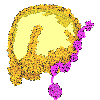 |
Apolipoprotein B-100 and LDL Receptor
April 2025 Insights into how LDL is removed from the bloodstream |
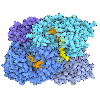 |
Enoyl-CoA Carboxylases/Reductases
March 2025 Enzymes that can quickly and efficiently fix carbon |
 |
Fifty Years of Open Access to PDB Structures
October 2021 The Protein Data Bank is celebrating its golden anniversary! |
 |
Lysozyme
September 2000 Lysozyme attacks the cell walls of bacteria |
 |
Myoglobin
January 2000 Myoglobin was the first protein to have its atomic structure determined, revealing how it stores oxygen in muscle cells. |
 |
Nanodiscs and HDL
September 2019 Nanodiscs conveniently package a small piece of membrane for experimental studies. |
 |
PDB Pioneers
October 2011 A dozen historic structures set the foundation for the PDB archive |
 |
Pepsin
December 2000 Pepsin digests proteins in strong stomach acid |
 |
Photoactive Yellow Protein
March 2017 Researchers use synchrotrons and X-ray lasers to reveal the rapid processes of light sensing. |
 |
Ribonuclease A
September 2008 Ribonuclease cuts and controls RNA |
 |
Selenocysteine Synthase
August 2008 Selenium is used in place of sulfur to build proteins for special tasks |
 |
Trypsin
October 2003 An activated serine amino acid in trypsin cleaves protein chains |
 |
Twenty Years of Molecules
January 2020 Celebrating the structural biology revolution |
Biomolecules - the building blocks of life (14)
 |
Aconitase and Iron Regulatory Protein 1
May 2007 Aconitase performs a reaction in the citric acid cycle, and moonlights as a regulatory protein |
 |
Adenine Riboswitch in Action
June 2017 XFEL serial crystallography reveals what happens when adenine binds to a riboswitch |
 |
Aspartate Transcarbamoylase
November 2017 Key biosynthetic enzymes are regulated by their ultimate products through allosteric motions. |
 |
Circadian Clock Proteins
January 2008 Circadian clock proteins measure time in our cells |
 |
Collagen
April 2000 Sturdy fibers of collagen give structure to our bodies |
 |
Concanavalin A and Circular Permutation
April 2010 For some proteins, clipped and reassembled sequences can produce the same 3D shape |
 |
Crystallins
July 2010 A concentrated solution of crystallins refracts light in our eye lens |
 |
Designed Proteins and Citizen Science
July 2021 What if people with no formal experience in science could help to improve or even rewrite nature, simply by playing a game? |
 |
DNA
November 2001 Atomic structures reveal how the iconic double helix encodes genomic information |
 |
Fifty Years of Open Access to PDB Structures
October 2021 The Protein Data Bank is celebrating its golden anniversary! |
 |
Globin Evolution
February 2017 The mechanisms of molecular evolution are revealed in globin sequences and structures. |
 |
Hemoglobin
May 2003 Hemoglobin uses a change in shape to increase the efficiency of oxygen transport |
 |
Insulin
February 2001 The hormone insulin helps control the level of glucose in the blood |
 |
Quasisymmetry in Icosahedral Viruses
August 2016 Viruses use quasisymmetry to build large capsids out of many small subunits |
Integrative/Hybrid Methods - combining techniques to explore huge assemblies (10)
 |
Amyloids
September 2015 Alzheimer's disease and prion diseases are linked to unnatural aggregation of proteins into amyloid fibrils. |
 |
Beta-galactosidase
June 2016 Beta-galactosidase is a powerful tool for genetic engineering of bacteria |
 |
Clathrin
April 2007 Three-armed clathrin triskelions are used to build molecular cages involved in transport |
 |
HIV Capsid
July 2013 At the center of HIV, an unusual cone-shaped capsid protects the viral genome and delivers it into infected cells |
 |
HIV Envelope Glycoprotein
January 2014 Envelope protein attaches HIV to the cells that it infects and powers fusion of the virus with the cell membrane |
 |
Microtubules
July 2014 The largest filaments of the cytoskeleton provide tracks for transport throughout the cell |
 |
Nuclear Pore Complex
January 2017 The nuclear pore complex is the gateway between the nucleus and cytoplasm. |
 |
Pilus Machine
July 2017 A molecular machine with a rotary motor builds a long protein filament involved in bacterial motility and attachment. |
 |
Proteasome
October 2013 Proteasomes destroy damaged or obsolete proteins inside cells |
 |
Vacuolar ATPase
March 2018 Two linked molecular motors are used to pump protons across membranes. |
Nobel Prizes and PDB structures - award-winning research (30)
 |
Adenylyl Cyclase
November 2020 Adenylyl cyclase creates second messengers to amplify signals from G-protein coupled receptors |
 |
Adrenergic Receptors
April 2008 Adrenaline stimulates a G-protein-coupled receptor, priming us for action |
 |
Aminopeptidase 1 and Autophagy
November 2016 Aminopeptidase 1 is delivered inside the cell using the machinery of autophagy |
 |
Antibodies
September 2001 Antibodies search for foreign molecules in the blood |
 |
Aquaporin
May 2014 Aquaporins create a channel for water molecules to cross through cell membranes |
 |
ATP Synthase
December 2005 ATP synthase links two rotary motors to generate ATP |
 |
Bacteriorhodopsin
March 2002 Bacteriorhodopsin pumps protons powered by green sunlight |
 |
Capsaicin Receptor TRPV1
October 2020 TRPV1 is an ion channel that senses heat and contributes to pain sensation. |
 |
Cascade and CRISPR
January 2015 Cascade and CRISPR help bacteria remember how to fight viral infection |
 |
Circadian Clock Proteins
January 2008 Circadian clock proteins measure time in our cells |
 |
Click Chemistry
December 2022 A modular approach to chemistry simplifies the construction of complex protein-targeting molecules. |
 |
Directed Evolution of Enzymes
December 2018 Biological evolution is being harnessed in the lab to create new enzymes. |
 |
DNA
November 2001 Atomic structures reveal how the iconic double helix encodes genomic information |
 |
G Proteins
October 2004 G proteins receive signals from cellular receptors and deliver them inside the cell |
 |
Hemoglobin
May 2003 Hemoglobin uses a change in shape to increase the efficiency of oxygen transport |
 |
Hepatitis C Virus Protease/Helicase
December 2020 Structures of hepatitis C viral proteins have led to the discovery of direct-acting antivirals. |
 |
Hypoxia-Inducible Factors
December 2019 HIF-α is a molecular switch that responds to changing oxygen levels. |
 |
Myoglobin
January 2000 Myoglobin was the first protein to have its atomic structure determined, revealing how it stores oxygen in muscle cells. |
 |
PDB Pioneers
October 2011 A dozen historic structures set the foundation for the PDB archive |
 |
Photosystem I
October 2001 Photosystem I captures the energy in sunlight |
 |
Photosystem II
November 2004 Photosystem II captures the energy from sunlight and uses it to extract electrons from water molecules |
 |
Piezo1 Mechanosensitive Channel
July 2018 Mechanosensitive ion channels give our cells a sense of touch. |
 |
Potassium Channels
February 2003 Potassium channels allow potassium ions to pass, but block smaller sodium ions |
 |
Ribonuclease A
September 2008 Ribonuclease cuts and controls RNA |
 |
Ribosomal Subunits
October 2000 Atomic structures of the ribosomal subunits reveal a central role for RNA in protein synthesis |
 |
Ribosome
January 2010 Ribosomes are complex molecular machines that build proteins |
 |
RNA Polymerase
April 2003 RNA polymerase transcribes genetic information from DNA into RNA |
 |
Spliceosomes
May 2020 Cryoelectron microscropy is revealing how spliceosomes cut-and-paste messenger RNA molecules. |
 |
Telomerase
November 2018 Telomerase maintains the ends of our chromosomes. |
 |
Tobacco Mosaic Virus
January 2009 A cylindrical arrangement of proteins protects a long strand of RNA in TMV |
PDB Data - understanding the information stored in the PDB archive (1)
 |
Fifty Years of Open Access to PDB Structures
October 2021 The Protein Data Bank is celebrating its golden anniversary! |
Protein Structure Prediction, Design, and Computed Structure Models - the PDB archive made protein structure prediction and protein design possible (3)
 |
Designed Proteins and Citizen Science
July 2021 What if people with no formal experience in science could help to improve or even rewrite nature, simply by playing a game? |
 |
Designer Proteins
October 2005 Researchers have successfully designed entirely new proteins based on biological principles |
 |
ZAR1 Resistosome
November 2023 Plants protect themselves from infection with immune system machines such as the resistosome |



